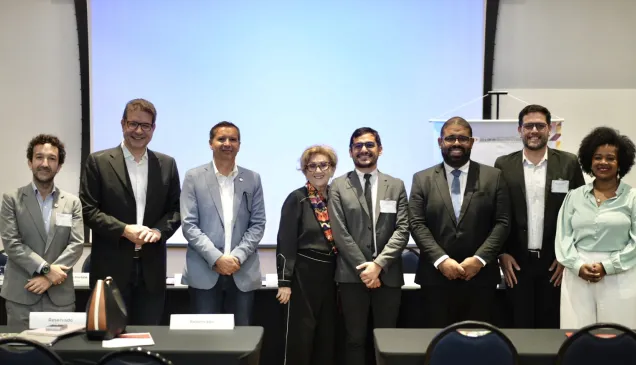Brazil: ICRC assembles experiences in order to prevent the impacts of violence on public services

Applied in five municipalities, the Safer Access system has already helped to stem the closures of public facilities by 40%, and presents a way for Brazil to make contributions in efforts to meet the Sustainable Development Goals (SDGs)
Brasilia/ ICRC – Mayors and officials from six Brazilian municipalities will gather in Brasilia to discuss best practices and lessons learned from introducing the Safer Access to Essential Public Services (SAF) strategy, created by the International Committee of the Red Cross (ICRC) to prevent and mitigate the effects of armed violence on vital public services like health, education and social assistance. Cities implementing the methodology report preliminary results suggesting that services have improved, with this positively impacting five of the UN's Sustainable Development Goals (SDGs).
The Safer Access Network meeting will be held on the 27th and 28th of August in Brasilia and will foster debates on how communities having access to essential public services is an important part of achieving the SDGs. Some of the issues that will be explored include: the significance of essential public services in the growth of cities; SAF support within crises involving violence and emergencies; the relationship between establishing SAF and the acceptance of services.
Representatives from the State Education Departments of Rio de Janeiro (SEEDUC) and mayors and officials from Duque de Caxias (state of Rio de Janeiro), Florianópolis (state of Santa Catarina), Fortaleza (state of Ceará), Porto Alegre (state of Rio Grande do Sul), Rio de Janeiro (state of Rio de Janeiro) and Vila Velha (state of Espírito Santo) will all take part in the meeting, along with representatives from Government Bureaus, Ministry of Justice, Ministries of Health and Regional Development, National Public Security Department (Senasp), Oswaldo Cruz Foundation and National Front of Mayors (FNP) and representatives from the ICRC.
By 2030, it's estimated that nearly two thirds of the world's population will reside in cities . One of the challenges arising from this expectation is the increase of armed violence in the face of uncontrolled urban growth. That why, since 2009, the ICRC has been forging partnerships with Brazilian municipalities in an effort to help reduce these essential public services' exposure to violence.
"Homicides are just the tip of the iceberg for armed violence in cities. The humanitarian consequences are critical and varied," stated Simone Casabianca-Aeschlimann, chief of the ICRC's Regional Delegation for Argentina, Brazil, Chile, Paraguay and Uruguay. "Violence causes schools, health facilities or other essential public services to close, and this has a direct impact on the community."
The Safer Access methodology has already trained over 20,000 professionals who provide essential services to the population since the beginning of 2019. Current estimates suggest that it has benefited more than 5 million people in the municipalities and institutions where it has been applied.
Filipe Tomé de Carvalho, Deputy Head of the Regional Delegation at the ICRC and manager of the SAF program, explains, "We here at the ICRC have been lending our experience and technical support, in addition to closely and continuously monitoring deployment in partnership with states and municipalities, so that they can apply the methodology in their systems. The protocols and measures deployed for preparing and reducing the exposure of workers are adapted according to the situation, needs and characteristics of each service unit. There is no simple formula."
Supporting compliance with the Sustainable Development Goals
Safer Access is rooted in and adapted from the ICRC's security protocols, drafted by pulling from the organization's vast working experience in circumstances involving armed conflict and armed violence. In offering this approach to government partners in Brazil, the organization believes it can provide support for the country in fulfilling five of the Sustainable Development Goals:
- Goal 3 – To ensure a healthy life and promote well-being for all, at all ages;
- Goal 4 – To ensure inclusive and equitable quality education, and promote lifelong learning opportunities for all.
- Goal 8 – To promote sustained, inclusive and sustainable economic growth, full and productive employment and decent work for all;
- Goal 16 – To promote peaceful and inclusive societies for sustainable development, provide access to justice for all and build effective, accountable and inclusive institutions at all levels;
- Goal 17 – To strengthen the means of implementation and revitalize the global partnership for sustainable development.
"Although we do not participate in the Sustainable Development Goals agenda as an organization, our endeavors help establish a link between humanitarian and developmental efforts covered by other organizations," asserted Tomé de Carvalho on the development of SAF and its potential to support Brazil in observing these goals.
- Read more about the Safer Access methodology
- Find out about the work performed by the International Committee of the Red Cross (ICRC) in Brazil here.
Further information
Sandra Lefcovich, ICRC Brasilia, +55 61 98175-1599, slefcovich@icrc.org @SandraLefcovich
Diogo Alcântara, ICRC Brasilia, +55 61 98248-7600, dalcantara@icrc.org



